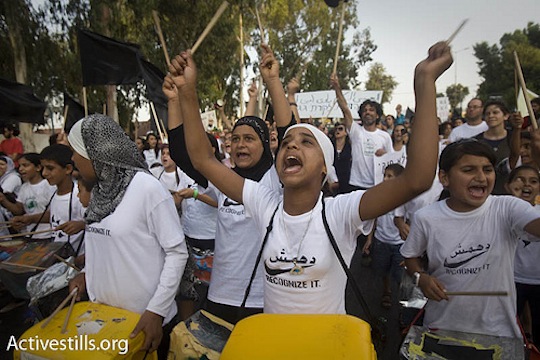The village of Dahmash has been around since 1948, and its residents have the documents to prove it. The authorities, however, have been threatening the unrecognized village with demolition for years. Now residents are taking matters into their own hands and putting together a festival to bring attention to their cause.

On Monday, March 16 — a day before the national elections — Israel’s High Court of Justice will hear an appeal by the residents of the unrecognized village Dahmash. The village, located between Ramle and Lyd (“Lod” in Hebrew), is not recognized by any local council. The hearing could set an historic precedent — should the High Court rules in favor of the residents, it will force the state to try and recognize the village, which would prevent home demolitions in the near future. However, if the Court rules against the residents, the threat of demolition will loom larger than ever before.
The unrecognized village Dahmash is under the jurisdiction of the Emek Lod Regional Council, a mere 20 minute drive from Tel Aviv. The village has been around since 1948, and its residents even have proof of ownership in the Israel Land Registry. However, the State does not recognize their claim to the land, and does not provide the village with the necessary infrastructure or even the most basic services, such as sewage, roads, electricity, garbage collection or a post office.
As opposed to the moshavim (a type of cooperative agricultural community) whose agricultural lands have been cleared for construction, the only thing the residents of Dahmash can do with their land is grow tomatoes. Despite the efforts by the residents, which included demonstrations, a lengthy court battle and funding for a master plan — all construction is deemed illegal.
There are currently 16 home demolition orders in the village. The struggle to prevent the destruction has lasted for over a decade, and has been successful due to the support of dedicated activists who supported the villagers over the years. For instance, in 2010, in the wake of a public campaign that included major protests on the main road in Ramle, which included artists and activists, the district court delayed the demolition orders against 13 homes, and gave the residents the opportunity to try and push forward a solution to resolve the status of the village. In the spring of 2014, the state attorney toured the village, and soon thereafter the residents’ appeal against the demolition orders — filed four years prior — was rejected. It wasn’t long before the original 13 demolition orders were reinstated, including another three orders. The state tried to begin the demolitions in July 2014.
In the wake of a legal battle by Attorney Qais Nasser, who represents the residents, and has been active on the issue of home demolitions, the court repeatedly delayed the demolitions. Since some of the hearings take place in front of different judges, some of them have officially agreed to delay some of the demolition orders until after the High Court hearing, while other judges decided not to delay the orders. As a result, some of the homes have been under immediate threat of demolition for a long time.
On Saturday, March 14, local activists are planning a protest event in the village. “Here we are, still struggling,” tells me Tamer Nafar, of the Palestinian hip hop group DAM and one of the central organizers of Saturday’s event. “We decided that this time we will put together a cultural event with many well-known artists, Arabs and Jews, to support the village and be able to create some noise around what is happening.” Saturday’s event will include performances by DAM, singer Amal Murkus, Hadag Nachash’s Sha’anan Street, and singer Joan Sfadi among others.
Read this article in Hebrew on Local Call here.


